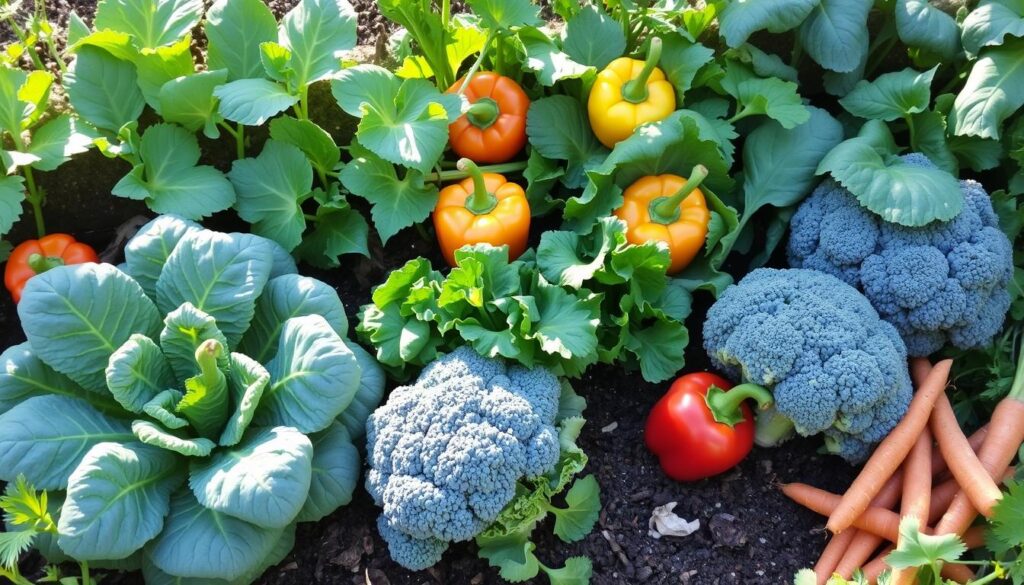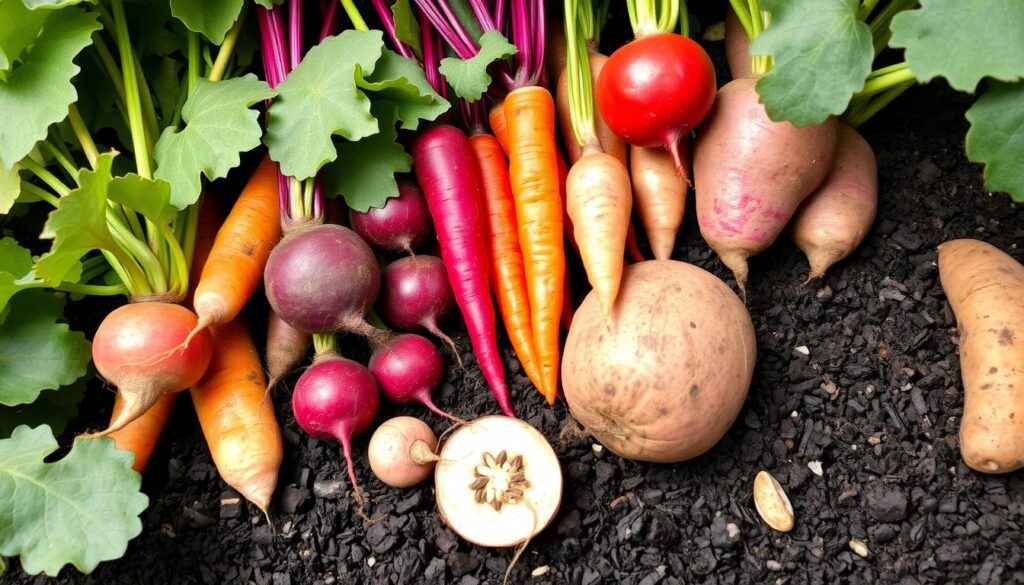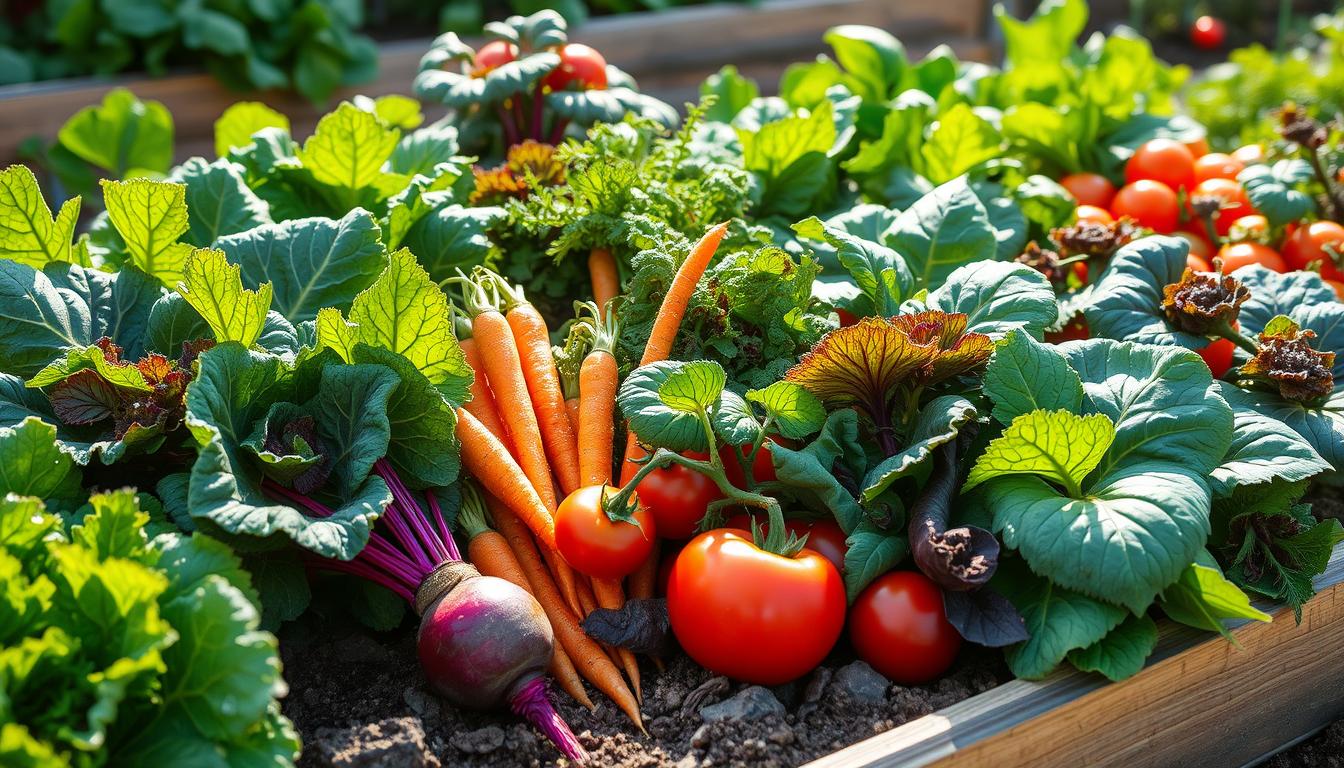I love gardening and always look for the best veggies to grow. It’s important to grow food that’s full of nutrients. In this article, I’ll share the top nutrient-dense veggies for a healthy garden.
Key Takeaways
- Discover the most nutrient-dense vegetables to grow in your garden
- Learn about the health benefits of a nutrient-rich diet and the importance of fresh, homegrown produce
- Explore specific nutrient powerhouses like leafy greens, cruciferous vegetables, and root vegetables
- Gain tips on planning and growing a thriving nutrient-dense garden
- Learn how to preserve and enjoy your nutrient-rich harvest
The Most Nutrient-Dense Vegetables to Grow in Your Garden
Creating a thriving home garden means focusing on the top nutrient-dense veggies. These veggies are full of vitamins, minerals, and plant compounds. By growing these, we can enjoy a harvest of fresh, nutritious food right from our gardens.
Leafy greens like kale and spinach are nutritional powerhouses. They are packed with antioxidants, vitamins, and fiber. Cruciferous veggies, including broccoli and Brussels sprouts, also offer a lot of nutrients. They even have compounds that fight cancer.
Root vegetables, like carrots and beets, are gems hidden underground. They are full of vitamins, minerals, and plant pigments. These nutrients are great for our health and well-being.
| Vegetable | Key Nutrients | Health Benefits |
|---|---|---|
| Kale | Vitamins A, C, K, and B6, calcium, iron, and magnesium | Supports eye health, bone strength, and immune function |
| Spinach | Vitamins A, C, K, and B2, iron, and folate | Promotes heart health, brain function, and muscle recovery |
| Broccoli | Vitamins C and K, folate, and fiber | Reduces inflammation, supports detoxification, and lowers cancer risk |
| Carrots | Vitamin A, beta-carotene, and fiber | Enhances eye health, boosts immunity, and supports skin health |
| Beets | Vitamins C and B9, manganese, and betalains | Improves blood flow, reduces blood pressure, and supports liver function |
By adding these nutrient-dense veggies to your garden, you’ll grow a lot of healthy food. This food will nourish your body and soul.
“Grow your own food, and you’ll reap the rewards of nutrient-rich, fresh produce that can’t be matched by anything store-bought.”
Why Grow Nutrient-Dense Veggies?
Adding more nutrient-dense veggies to your diet is great for your health. They boost your overall well-being and support your body’s functions. Plus, growing your own veggies offers benefits that store-bought can’t match.
Benefits of a Nutrient-Rich Diet
Eating a diet rich in fresh veggies brings many health perks. It can improve your heart health, boost your immune system, and enhance digestion. These veggies also have antioxidants, which fight off cell damage and lower disease risks.
Importance of Fresh, Homegrown Produce
- Homegrown veggies keep more nutrients than those shipped long distances.
- You can grow veggies without harmful pesticides or preservatives.
- Homegrown produce tastes better and is more enjoyable to eat.
| Nutrient | Homegrown Produce | Store-Bought Produce |
|---|---|---|
| Vitamin C | 30% more | 45% less |
| Antioxidants | 20% more | 30% less |
| Flavor | Richer, more vibrant | Bland, less appealing |
Growing your own nutrient-dense veggies leads to a healthier, tastier diet. You’ll enjoy the many benefits of fresh, homegrown produce.
Top Nutrient Powerhouses for Your Garden
Some vegetables are true superstars in a garden. They are not only fun to grow but also full of vitamins, minerals, and plant compounds. By adding these to your garden, you’ll get the freshest, healthiest food right from your backyard.
Leafy greens like kale and spinach, and veggies like broccoli, carrots, and beets are top choices. They are known for their high nutritional value and health benefits.
| Vegetable | Key Nutrients | Health Benefits |
|---|---|---|
| Kale | Vitamins A, C, and K, calcium, iron | Supports bone health, immune function, and eye health |
| Spinach | Vitamins A, C, and K, folate, magnesium | Promotes heart health, brain function, and muscle development |
| Broccoli | Vitamins C and K, fiber, sulforaphane | Fights cancer, boosts detoxification, and supports immune health |
| Carrots | Vitamin A, beta-carotene, fiber | Enhances vision, supports skin health, and reduces inflammation |
| Beets | Folate, manganese, nitrates | Lowers blood pressure, improves athletic performance, and supports cognitive function |
Adding these vegetables to your garden will give you the healthiest food. Growing a variety of these will make your garden more nutritious.

Leafy Greens: A Nutritional Goldmine
Leafy greens are true superstars in any garden. They are full of vitamins, minerals, and antioxidants. This makes them a great way to add nutrition to your meals. Kale and spinach are two of the most nutritious greens you can grow.
Kale: The King of Greens
Kale is known as the “king of greens” for good reason. It’s loaded with vitamins A, C, and K, and also has fiber, calcium, and iron. Adding kale to your garden boosts nutrition and adds beauty with its vibrant leaves. You can sauté, roast, or add it to salads for a nutritional kick.
Spinach: A Classic Superfood
Spinach is another must-have in your garden. It’s packed with vitamins and minerals like A, K, folate, and magnesium. You can enjoy it raw, sautéed, or in smoothies. Growing spinach means you always have this superfood on hand for healthy meals.
Growing kale and spinach in your garden is a smart move. They add essential nutrients and color to your food. Plus, they make your meals more interesting and nutritious.
Cruciferous Vegetables: Cancer-Fighting Champions
Cruciferous veggies like broccoli, kale, and cauliflower are top fighters against cancer. They have special compounds that may lower cancer risks. This includes prostate, breast, and colon cancer.
Broccoli: A Nutritional Powerhouse
Broccoli is a leading cancer-fighting veggie. It’s a homegrown produce full of sulforaphane. This compound fights cancer cells and neutralizes harmful substances.
Studies show broccoli can lower cancer risks. It’s also rich in vitamins, minerals, and antioxidants. It has vitamin C, fiber, folate, and chromium, making it great for health.
“Eating a diet rich in cruciferous vegetables like broccoli has been linked to a lower risk of several types of cancer, including prostate, breast, and colon cancer.”
Growing broccoli in your garden is more than tasty. It’s a step towards a healthier life. Adding it to your diet can make a big difference.
Root Vegetables: Nutrient-Packed Underground Treasures
Vegetable gardens are full of nutritional treasures. Root crops like carrots and beets are top picks. They grow well in home gardens and offer lots of vitamins, minerals, and antioxidants.
Carrots: A Vibrant Source of Vitamin A
Carrots are known for their bright orange color and nutritional value. They are packed with beta-carotene, which turns into vitamin A. This vitamin is key for good vision, a strong immune system, and healthy skin. Growing carrots at home means you always have this nutritious food on hand.
Beets: A Colorful Nutrient Bomb
Beets are not just pretty; they’re also full of nutrients. Their red and purple colors come from betalains, which help fight inflammation and detoxify the body. Beets are also rich in vitamins, minerals, and fiber. They add a lot of value to any garden.
| Nutrient | Carrots | Beets |
|---|---|---|
| Vitamin A | ✓✓✓ | ✓ |
| Vitamin C | ✓✓ | ✓✓✓ |
| Fiber | ✓✓ | ✓✓✓ |
| Folate | ✓ | ✓✓✓ |
Adding carrots and beets to your garden means you’ll always have fresh, nutritious food. These root vegetables are great for anyone who cares about their health and wants to grow their own food.

Planning and Growing Your Nutrient-Dense Garden
Starting a nutrient-dense garden is a rewarding journey. It can give your family a lot of fresh, healthy food. First, focus on the soil. Good soil and compost are essential for growing healthy crops.
Soil Preparation and Composting
Healthy soil is the key to a great garden. Start by checking your soil’s pH and adjusting it if needed. Add organic matter like compost to make the soil better.
Composting is a big help for soil health for nutrient-rich crops. It turns kitchen scraps and yard waste into a nutrient-rich compost. This compost feeds your plants and makes your garden better.
Companion Planting for Optimal Growth
Companion planting is a smart way to make your homegrown superfoods grow better. It involves placing plants together to help each other grow. This can improve how plants absorb nutrients and fight pests.
For instance, marigolds can keep pests away from tomatoes. Basil can make your companion planting for homegrown superfoods taste better and grow stronger. Try different pairings to make your garden thrive.
By focusing on soil health, composting, and companion planting, you’ll grow a planning nutrient-dense garden. This garden will give your family lots of fresh, healthy vegetables.
Preserving and Enjoying Your Nutrient-Rich Harvest
Enjoying the fruits of your labor from your garden is a joy. It’s important to know how to keep your superfoods fresh and full of nutrients. By using the right storage and cooking methods, you can keep your garden’s bounty healthy and tasty for a long time.
Preserving the Nutrient Density
To keep your veggies packed with nutrients, try these tips:
- Proper storage: Use the fridge, canning, or freezing to keep them fresh and prevent nutrient loss.
- Minimal processing: Choose gentle cooking like steaming or sautéing to keep nutrients intact.
- Timely consumption: Eat your veggies as soon as you can for the best taste and nutrition.
Enjoying Your Nutritious Harvest
With your preserved veggies, you can make healthy and tasty meals. Find fun ways to add your superfoods to your diet:
- Add them to salads, stir-fries, or roasted dishes.
- Blend them into smoothies or juices for a nutrient boost.
- Try new recipes to highlight your garden’s flavors and textures.
By preserving and enjoying your harvest, you’ll get the most health benefits from your garden. Enjoy the flavors and know you’re feeding your body with the best nature offers.
| Preservation Method | Nutrient Retention | Shelf Life |
|---|---|---|
| Refrigeration | High | 1-2 weeks |
| Freezing | Moderate to High | 6-12 months |
| Canning | Moderate | 1-5 years |
| Dehydration | Moderate to Low | 6-12 months |
“Preserving the nutrient-rich harvest from your garden is a labor of love, but the rewards are well worth the effort.”
Conclusion
The most nutrient-dense vegetables are packed with vitamins, minerals, and antioxidants. Growing these superfoods in your garden brings vibrant flavors and textures. You also get the health benefits of a nutrient-rich diet.
From kale’s antioxidants to broccoli’s cancer-fighting properties, each veggie has its own health perks. These benefits can boost your overall well-being.
Having a nutrient-rich garden is crucial. Fresh, homegrown produce is a top source of nourishment. It lets you control your health and add vital nutrients to your diet.
By adding these veggies to your meals, you fuel your body with what it needs to thrive. This is key for your health.
The advantages of a nutrient-rich garden go beyond just eating well. They support a strong immune system and overall health. These powerful vegetables are a gift to your health and well-being.
As you care for and harvest your garden, enjoy the joy of growing your own fresh, nutritious food. It’s a flavorful and healthy gift to yourself.



Leave a Reply